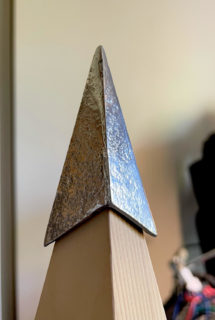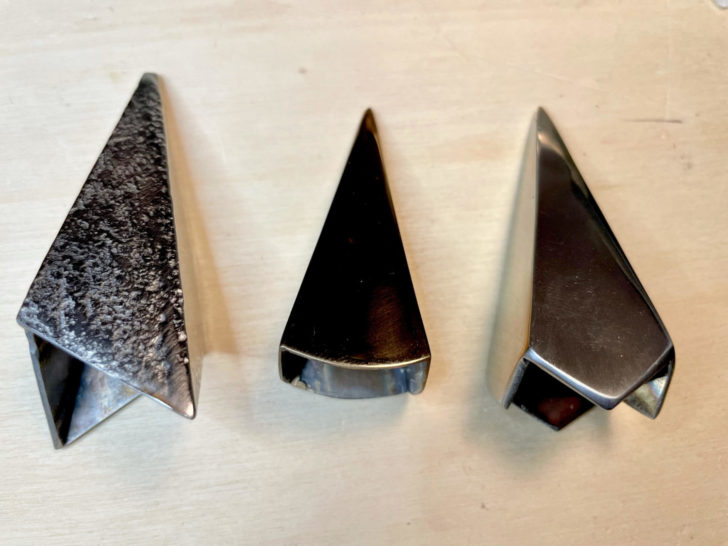Superbooth 2021: La Voix du Luthier’s Christophe Duquesne gave us an update on their unique acoustic resonators for electronic musicians.
La Voix du Luthier has created two acoustic resonators, the Onde and the Pyramide, that are designed to be an alternative to using speakers to amplify electronic instruments. They originally debuted at Superbooth 2019.
They are in the tradition of the diffuseurs of French instrument designer Maurice Martenot. Instead of being designed to reproduce sound accurately or ‘flat’, they’re designed to resonate, to become part of your electronic instrument and part of your sounds.
This essentially turns your electronic instrument into an acoustic one. It does this by using the signal from your instrument to vibrate wood acoustic resonators, similar to the way a guitar string causes the guitar body to resonate and you hear the resonant sound of the guitar body.
This approach means that your sounds are affected by the resonances of the Onde or Pyramide, which adds a physical dimension to your performances. This also makes it ideal for electronic musicians wanting to perform with acoustic musicians.
The company has announced that they now have all Onde and Pyramide resonators in regular production, and this has made it possible to start taking customization requests. They shared several examples (shown in the gallery at top).
“We can do custom finish (as for the Black Pyramid above that was shipped to a customer in Japan), or rework the design of sound holes, as for the Champagne Pyramid above, or add some specific marking or logo, etc.,” notes Duquesne.
“Another thing is that we have just produced a set of 10 pyramidions that nicely cover the Pyramid,” he adds. “They are all hand made in, and all different from each other: different finishes, different shapes, different sizes! They can be purchased together with a Pyramid, but also separately for those who already have a Pyramid.”
See the La Voix du Luthier site for more information.








Great work, Christophe!
good luck finding 10 ppl that are interested in this.
i dont care about half the things on here, but that doesnt mean those things dont have value to some folks. I won’t buy one, but it’s a fascinating and rare concept at least to read about.
to me its grandpas junk.
you can’t change the sound of it.
these days we have digital resonators that let you modulate size/pitch, decay and what have you.
they are much more useful for the synthesis of sound than these wooden objects. 😉
My interest isn’t in its tonal shaping possibilities but it what kind of tonal presence it makes in a performance space.
I sing in a classical counter-tenor range but often recompose backings to include contemporary instruments – drum machines, synths, samplers. Think John Dowland over R’nB or Drum’n’Bass.
I find in performance it is often difficult to get a balance and blend between these elements and my voice. I’m wondering if using the Ondes might help with that.
“Expensive speaker cabinets”
We found the guy that doesn’t understand how speakers work.
Hint: These are designed specifically to do what speakers are designed NOT to do.
We found the guy than doesn’t understand quotation marks and underestimate the knowledge of others
Peace my friend!
😀
I checked the summary and also the La Voix du Luthier website, and I cannot find “Expensive speaker cabinets” printed anywhere. So it seems you neither understand the design and intent of this instrument, nor how to make proper use of quotation marks.
god sometimes i hate this @#$*&^ forum. Synth folks can be the best……or the worst.
At least it’s not another B-sh*tshow post.
I like the concept, although I have no current use for it.
oh absolutely, i think the concept is fascinating. The immediate dog fighting i read earlier about the “value” of this post vs others is what bugs me. I thought we liked synthesizers and tech info because its fun, right? Oh god, the behringer posts haha, yea, i dont even look anymore, i cant.
yes, fascinating concept! cant afford one, but beautiful craftsmenship and creativity.
Wish I had the opportunity to get an Ondes down unda to the Antipodes – at an affordable price :-).
Such a great concept/product to explore the crossover between electronic and classical acoustic performance.
I love that word “antipodes”. Good post :0)
I think these are very interesting. I may get one in the future. I love the vibe they’ve given to the instruments I’ve heard. Coupled with an Osmose or Hydrasynth, this could be a fascinating combination.
I think a Therevox would be a strong candidate for this too.
Here’s a impressive pairing of theremin with one of the resonators:
https://www.youtube.com/watch?v=ZVue-QsxuzA
I used to have a Leslie rotating speaker, and the sound was expansive and moving, and it responded to the room.
I imagine these resonators will change the way we listen to electronics as well.
Who wants to run around with a microphone or two to record electronic sound?
Leslie is much in your face than the subtile things a resonator does.
In an untreated room you will probably record more of the room resonances than what the thing does.
It’s the most unpractical thing I can imagine.
Clearly you’ve never tried performing on an electronic instrument with acoustic musicians or ensembles where you listen and respond to what you hear.
For situations like that, these resonators are extremely practical.
You’re making the sadly typical reaction of too many electronic musicians of rejecting things that you don’t have any experience with vs trying to understand what makes a new tool useful.
I totally understand what this is doing to sound. 😉
strangely you are assuming that electronic musicians are interested in the very limited range of things this is capable of doing. we have much more powerful tools. You dont have a clue about sound design, have you? 😉
So no thx, have a nice day.
“electronic sound” is really, truly, not a thing.
plenty of people like to record electronic instruments in all sorts of environments.